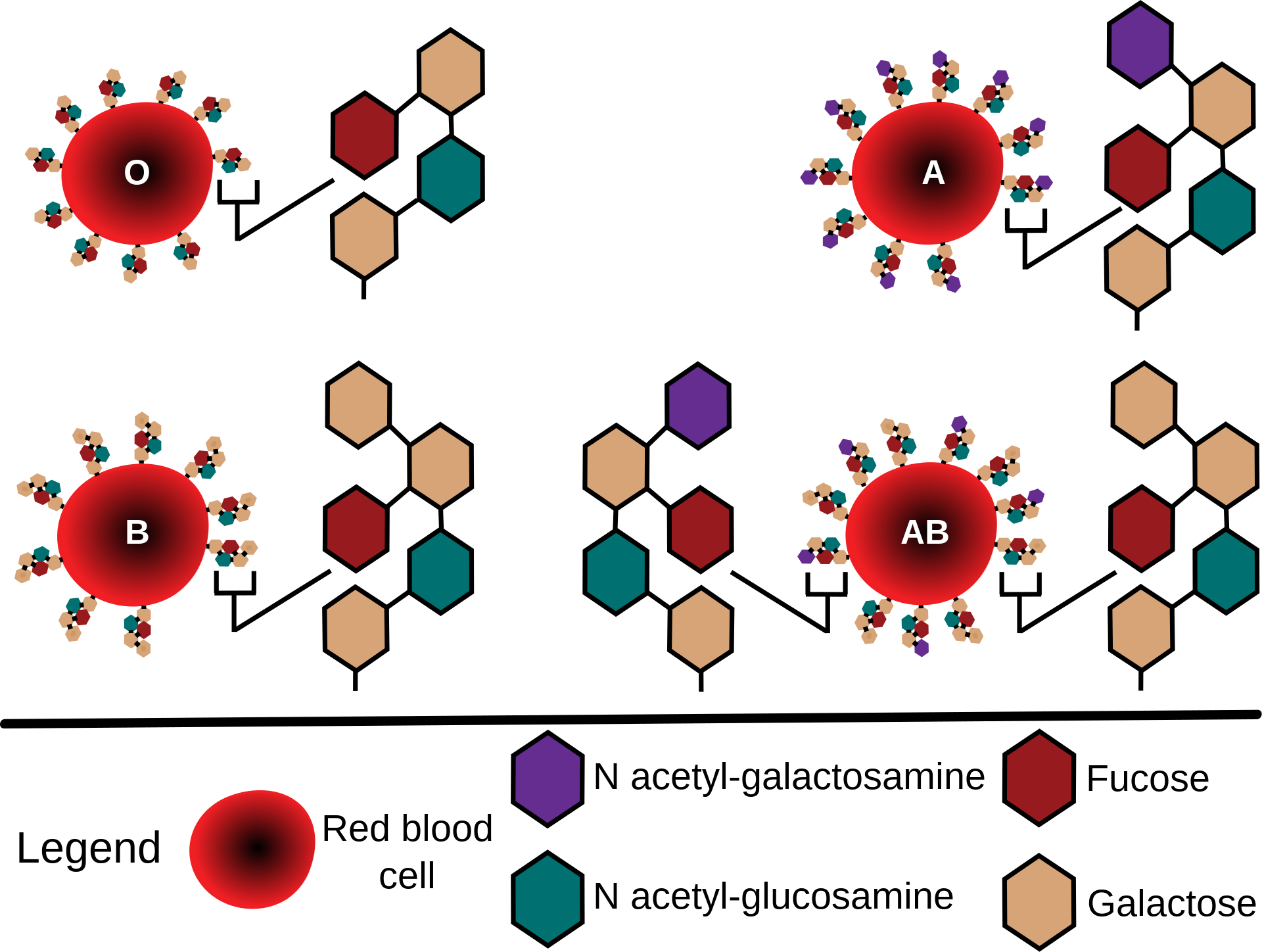So, we’ve talked a lot about blood lately. (This is the third recent post about what blood can tell us. There’s yesterday and last week. But, you can search for ‘blood’ in the index to find a slew of posts about our blood system.)
What I haven’t shared with you is what some labs are doing to make blood transfusions a little more universal.
First, a little background.

Our blood is characterized by its two basic antigens- A and B. These antigens are really carbohydrates (sugars) attached to our red blood cells. Each of us has one antigen, both, or neither. That’s why we call the blood types A, B, AB, or O. Obviously, type AB has both antigens and O lacks them completely.
We match the blood in transfusions to preclude reactions- blood clotting, and the like, if the antigens don’t match what our body expects.
Way back in the 1980’s, Drs. J. Goldstein, G Siviglia, R Hurst, L Lenny, L Reich demonstrated that green coffee beans could yield an enzyme that would strip out B antigen from our red blood cells. Unfortunately, that required more than a few steps to render it practical.
Another group from the University of British Columbia under Dr. Stephen G. Withers (the rest of the team includes Drs. P Rahfeild, L Sim, H Moon, I Constantinescu, C Morgan-Lang, SJ Hallam, and JN Kizhakkedathu) published their findings (Nature Microbiology) that they could strip out the A antigen. An anaerobic gut microbe, Flavonifractor plautii, had the enzymes necessary for this feat.
But, now Dr. H. Clausen (University of Copenhagen) has examined a slew of microbes to find out which ones have enzyme to remove the antigens from our blood. (The research team includes QP Liu, H Yuan, G Pietz, K Saunders, J Spence, E Nudelman, T White [ZymeQuest]; G Sulzenbacher, B. Henrissat and Y Bourne [French Center for National Research]; EP Bennett [U Copenhagen]; SB Levery [New Hampshire]; and JM Neveu, WS Lane, and ML Olsson [Harvard]. Their article was published in Nature Biotechnology.] Bacteroides fragilis (a gut microbe) swipes out he B antigen. Elizabethkingia meningosepticum (an opportunistic infectious microbe) strips out the A antigen. Both of these are needed at very low dosages, especially when compared with the coffee-bean-extracted enzyme.
ZymeQuest (aka Velico Medical of Beverly MA) is hoping to commercialize this development, after it determines if the converted blood is safe and effective. If it is, you can bet this will be a hot seller, since O (the universal blood donor) is always in short supply.
Maybe this will alleviate our perennial blood shortages.







Wow, I didn’t realize the antigens were carbohydrates! What makes type O lack them?
Martha recently posted..Air Fried Salmon
It’s not something that makes them lack the antigens; it’s part of our genetic makeup. And, it’s part evolution (many folks who emanated from Africa are type O) as well as environmental pressures that set the stage.
Wow, this is a great read and I learned something new. I’m glad I took the time to read it.
Barb recently posted..Why Automation is not always the best strategy
Thanks for the visit AND the comment, Barb.
We can only hope they can develop it and make it commercially available at some point. That would be awesome! Type O is always in short supply as you say.
Kemkem recently posted..Nou de Octubre Holiday In Valencia
Especially when there are disasters, Kemkem. Let’s hope this idea passes muster.
This is truly interesting… And I did not know that O is always in short supply (Guessing it is more specifically O-?) …..I am O+ myself..
It’s not that O is in short supply- all blood supplies are, and O is the universal donor. So, given great stores of O would mean everyone can be helped quickly with transfusions.
That’s interesting. I have not donated blood in a long time but a former co worker has done so for many years. The supply is always less than the demand. Were you also going to discuss Rh compatibility in a future post? One of my husbands aunts was Rh negative which led to complications when she was giving birth.
Rh is not as much of a problem with donations. But, it is a terrible issue during pregnancy. (My anecdotal story is my brother- he was rh+ and my mom’s negativity created all sorts of issues.)
This sounds very interesting research.Will need a lot of work though before it gets mainstreamed worldwide.
The issue is that the firm has already sold (part of the) rights to another firm. And, it’s entirely possible this will go the same way the synthetic blood substitutes went. (My reporting https://www.adjuvancy.com/wordpress/donors-needed/ Current data: https://www.medscape.com/answers/207801-168635/what-is-the-efficacy-of-polymerized-hemoglobin-blood-substitutes)